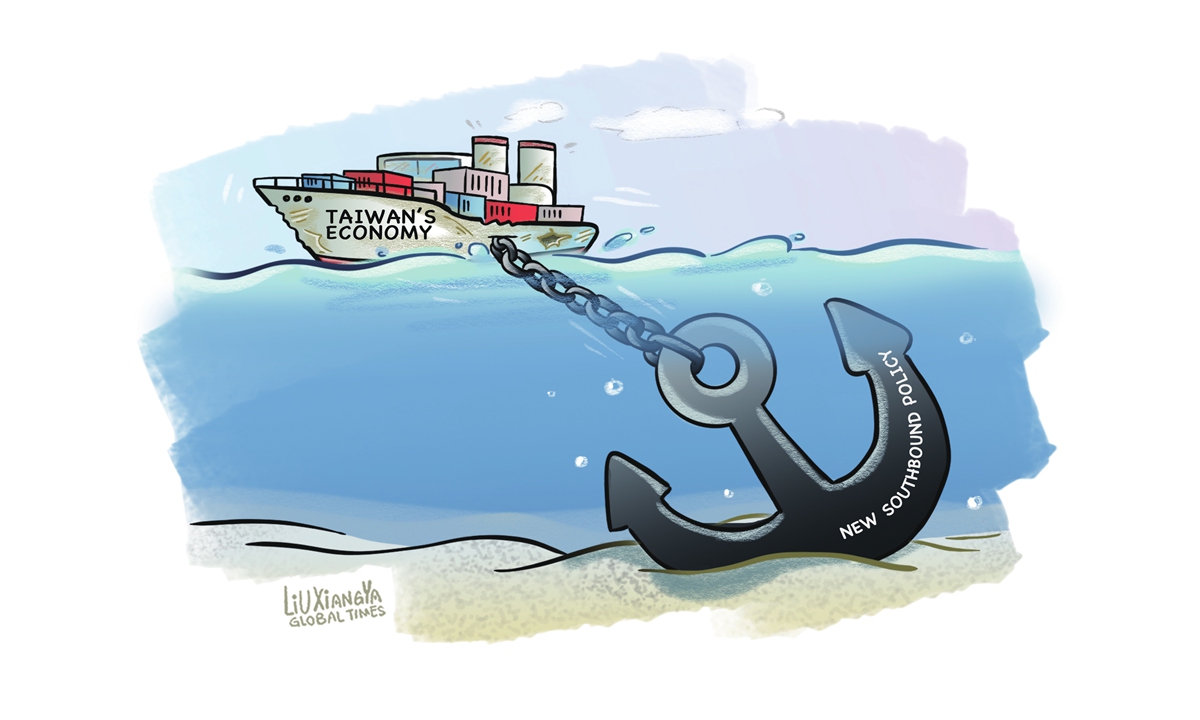
Illustration: Liu Xiangya/Global Times
Less than two weeks after the conference of cross-Straits entrepreneurs summit, where Taiwan entrepreneurs expressed their strong desire to grasp opportunities in the Chinese mainland, some media outlets are seeking new ways to vilify cross-Straits economic cooperation.
Singapore-based newspaper Lianhe Zaobao claimed that the mainland is seeing its economic influence on Taiwan island ebb, citing a report from the Wall Street Journal (WSJ) saying that Taiwan island's exports to the US in the first 10 months of 2023 were up more than 80 percent from the same period of 2018, but exports to the Chinese mainland were 1 percent lower.
The decoupling hype is erroneous, which fails to recognize the indivisibility of the cross-Straits economy.
Has the mainland's economic influence on Taiwan ebbed? A string of economic indicators can help answer the question. Data from the 2023 annual conference of the summit for entrepreneurs across the Taiwan Straits, which was held in Nanjing, East China's Jiangsu Province on November 14-15, show that total trade between the mainland and Taiwan nearly doubled in the past 10 years, from $168.9 billion in 2012 to $319.6 billion in 2022. The cumulative actual use of capital from Taiwan island reached $72 billion, according to the Xinhua News Agency.
Despite the Democratic Progressive Party (DPP) authorities in Taiwan island attempting to obstruct economic and trade exchanges across the Straits and even advocating "decoupling," entrepreneurs in Taiwan island believe that these actions cannot hinder economic cooperation by Taiwan enterprises in the mainland. Businesses from Taiwan island remain highly optimistic about the promising development opportunities in the Chinese mainland market and are committed to continuing their investments, despite strained cross-Straits relations, Lai Cheng-i, chairman of the General Chamber of Commerce of Taiwan island, told the Global Times earlier this month.
There is no need to deny that Taiwan's exports to the mainland have encountered challenges and declined in the first 10 months of this year. Some people in Taiwan island try to use this as proof that the "New Southbound Policy" promoted by the DPP is effective. But, they grossly ignored the failure of the policy, as it fails to boost the economy. Instead, the "New Southbound Policy" has become a drag on Taiwan's economy.
Aside from riding on the coattails of the US, Taiwan island's regional leader Tsai Ing-wen and her team have actively promoted the so-called "New Southbound Policy," attempting to pull Taiwan away from the mainland by strengthening economic ties with countries such as Southeast Asian economies and Australia.
However, statistics show that Taiwan's trade surplus with the "New Southbound Policy" region dropped from $22.6 billion in 2016 to $13.4 billion in 2022, a decrease of about 40 percent, according to media reports. At the same time, the proportion of the trade surplus to GDP has also decreased, indicating a decline in its contribution to GDP growth. Some experts believe these figures show that the "New Southbound Policy" has failed.
As reported by Reuters in August, the island's statistics authorities said Taiwan's economy will probably grow at its slowest pace in eight years this year, held back by soft demand for its technology products amid global economic woes.
Taiwan island's economy is export-oriented, with the mainland market being its important trading destination. At a time when the economy is facing downward pressure, efforts to continue implementing the "New Southbound Policy" are foolish and dangerous.
China released a document in September that outlines support measures to develop East China's Fujian Province into a demonstration zone for the integrated development across the Taiwan Straits. As reported by Xinhua, the circular, jointly issued by the Communist Party of China Central Committee and the State Council, said the move is aimed at deepening cross-Straits integrated development in all fields and advancing the peaceful reunification of the motherland.
The hype of economic "decoupling" and the DPP's push for the "New Southbound Policy" cannot hinder cross-Straits integrated development and economic cooperation.
The author is a reporter with the Global Times. bizopinion@globaltimes.com.cn
